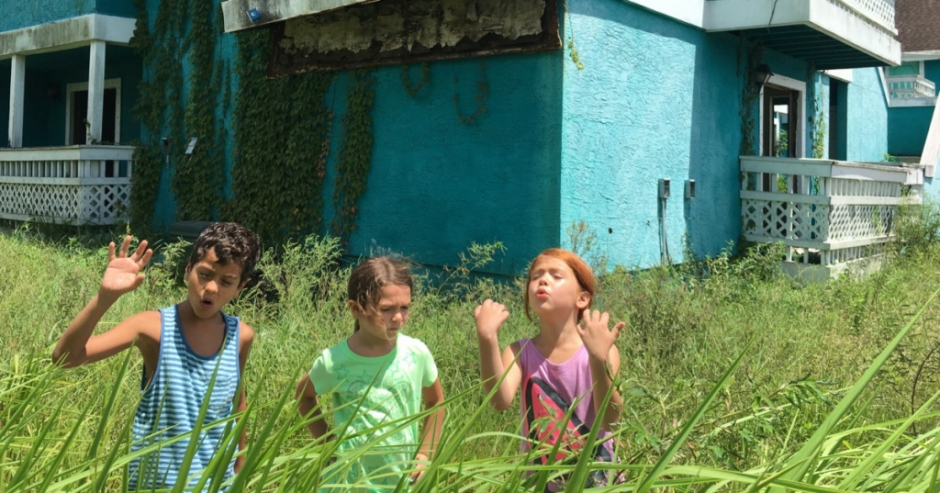The latest in an emerging genre of a kind of post-Obama American social realism, The Florida Project lands us smack bang in the sticky heat of a Floridan summer in the run-down outskirts of the Magic Kingdom. Disneyland is a looming presence kept mostly off screen, but gaudily implied by the structures of our Orlando banlieue. A giant gurning wizard sprawls greedily over a mall rooftop, a wonky sign welcomes visitors to ‘Futureland’ motel, walls are painted the purples and golds of fairy-tale castles.
It is in once such motel where we meet long-term residents Halley (Bria Vinaite) and her lively six year old daughter Moonee (Brooklynn Prince) who piece together a defiant and energetic life of playtime and increasingly dodgy money-making schemes. They flick the bird at the tourist helicopters which sweep in and out like cartoon versions of the choppers from Apocalypse Now, and Moonee fills her free time with her mischievous friends who spit on cars, spy on residents and fleece richer parents for ice cream money.
Director Sean Baker, whose previous credits include the wonderful Tangerine, gets an astonishingly good performance out of all of the kids, but especially Prince whose joyful spirit and cheeky grins seem entirely natural and heartfelt. Perhaps they were. At times it seems like Baker just told the kids to go out and play and captured whatever happened next. There’s a particular genius in teaching child actors to stop acting.
The children, especially Moonee, are ubiquitous in the film, only a thundering of feet away from entering every scene, noses pressed against glass. Which is much to the increasing chagrin of the adults, especially the gentle, well-meaning manager Bobby, played with gallons of warmth by Willem Dafoe. Baker gives the children colourful backdrop after colourful backdrop as they run wild and free among dangerously decrepit environs and all its hidden threats – one points to the thick reeds of the swamp and says “there’s crocodiles in there”.
But it’s a credit to the script that the joys of this existence are foregrounded and the decay of the world is kept patiently as a backdrop until the dramatic tension needs it to step in. As such, the film is careful not to angle its finger of blame in any one clear direction. Like in a fairy-tale land, evil is banished, and what remains is a complex blend of hardship and kinship, desperation and joy in all their measures and balances. It would’ve been too easy to show a Mickey Mouse sign with his eyes scratched out because the societal problems which lead to poverty are not so banally summarised.
Instead, the swirl and drift of actions and consequences, whipped up by the chaos of life, soon upend Halley’s balance and, with commendable editorial choices, the full picture of her changing circumstance unfolds. We are drawn, woozily, carefully, into the sharp agonies of the fragile state of the poverty-line and how quickly things can go from bad to worse. The result is no clear Disney baddie to fight and defeat, but a sudden helplessness, like a promise unfulfilled, an unsold beach-house left to decay.
By the latter half, this is by no means an easy film to witness, but, like Moonlight and American Honey before it, The Florida Project stands proud as an important experience. It gleefully offers a generous coating of sugar to help the medicine go down, but not just as a panacea; the joy, I think, is the greater point. By keeping the focus on the mischief of the six-year olds and letting Moonee have her freedom to squeeze every drop of fresh juice out of her world, we are left with an exuberant message. Happiness, in the eroding innocence of a child, is still very much with us, and still very much ours.

